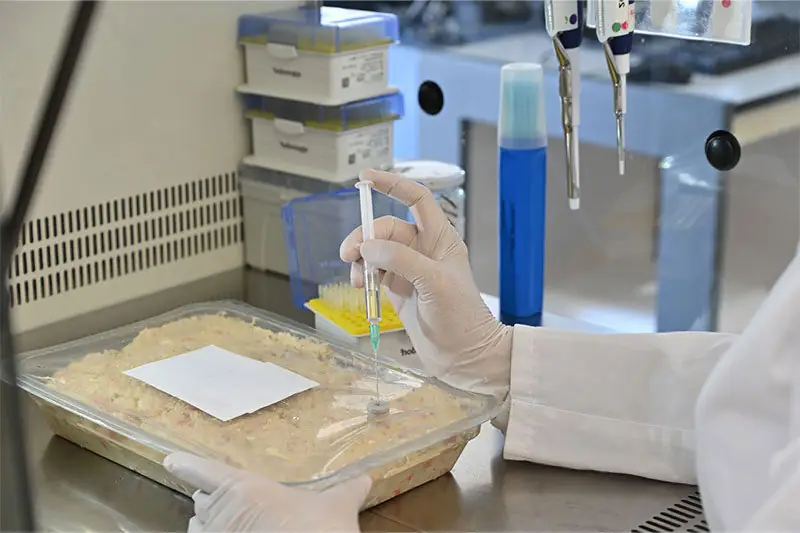ISO 22719 Detection of Candida Albicans in Cosmetics Testing
The ISO 22719 standard provides a comprehensive framework for the microbiological safety testing of cosmetic products. This service focuses specifically on the detection and identification of Candida albicans, a common opportunistic pathogen that can cause infections if present in cosmetic formulations. Ensuring that cosmetics are free from harmful microorganisms is crucial for maintaining consumer health and safety.
The ISO 22719 methodology involves several key steps to ensure accurate detection and quantification of Candida albicans. These include the proper sampling of the cosmetic product, preparation of the specimen in a manner that preserves the integrity of the microorganisms, and the use of appropriate culture media and incubation conditions. The standard also emphasizes the importance of sterility in all procedures to prevent contamination.
The testing process begins with the collection of an adequate volume of the cosmetic sample, which is then inoculated onto a specialized agar medium that supports the growth of Candida albicans. This medium typically contains antifungal agents and other components designed to inhibit the growth of unwanted microorganisms while promoting the specific growth of Candida albicans colonies.
The specimen is incubated under optimal conditions, which may vary depending on the environmental requirements specified in ISO 22719. Once the colonies are visible, they are examined using microscopic techniques and other diagnostic tools to confirm the presence and identification of Candida albicans. This step is critical as it ensures that the detected microorganisms match the target pathogen.
The results of the test are reported according to ISO 22719 guidelines, which include details on the number of colonies counted, their morphology, and any other relevant observations. The report also provides a determination of whether the cosmetic product complies with the microbiological safety requirements set forth in the standard.
By adhering strictly to ISO 22719, laboratories can ensure that the detection and identification of Candida albicans are accurate and reliable. This not only helps manufacturers meet regulatory requirements but also enhances consumer confidence in the safety of their products. The use of this international standard is particularly important for companies operating in multiple countries, as it provides a consistent benchmark across different jurisdictions.
- Customer Impact: Ensures compliance with global standards, reduces the risk of product recalls due to microbial contamination, and enhances brand reputation through demonstrated commitment to quality and safety.
- Satisfaction: Provides peace of mind for consumers knowing that their products meet stringent microbiological safety criteria. It also allows companies to focus on innovation rather than regulatory compliance issues.
Scope and Methodology
The scope of the ISO 22719 standard includes the detection, isolation, and identification of Candida albicans in cosmetic products. This service is particularly relevant for companies that produce or distribute personal care items such as lotions, soaps, shampoos, and makeup.
The methodology outlined in ISO 22719 provides a detailed framework for the microbiological examination of cosmetic products. It specifies the sampling procedures, culture media, incubation conditions, and diagnostic techniques to be used during the testing process. The standard also includes acceptance criteria that define what constitutes a pass or fail result.
The first step in the methodology is the selection of an appropriate sampling plan. This involves determining the number of units to be sampled based on the batch size and the desired level of confidence. Once the sample has been collected, it must be prepared according to strict protocols to ensure that any microorganisms present are not altered or destroyed during preparation.
The next step is inoculation onto a specialized agar medium designed to support the growth of Candida albicans. This medium typically contains nutrients and antimicrobial agents specifically formulated for this purpose. The sample is then incubated under controlled conditions, which may include specific temperature ranges and durations as specified in ISO 22719.
Upon completion of the incubation period, any colonies that have formed are examined using microscopic techniques to confirm their identity as Candida albicans. This step often involves the use of stains or other reagents that enhance the visibility of characteristic features of the pathogen. The results of these observations form the basis for the final determination of compliance with the standard.
The acceptance criteria specified in ISO 22719 dictate the maximum allowable levels of Candida albicans in cosmetic products. If the number of colonies detected falls within this range, the product is deemed compliant. Exceeding these limits may indicate a potential health risk and could result in further investigation or corrective actions.
The methodology described in ISO 22719 ensures that all aspects of the testing process are conducted with the highest level of precision and accuracy. This consistency across laboratories helps to maintain uniformity in results, thereby enhancing the reliability of microbiological safety assessments for cosmetic products.





